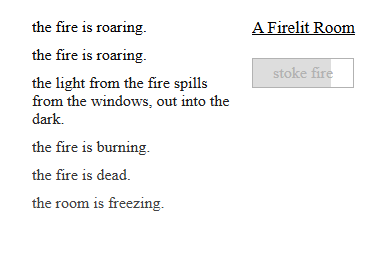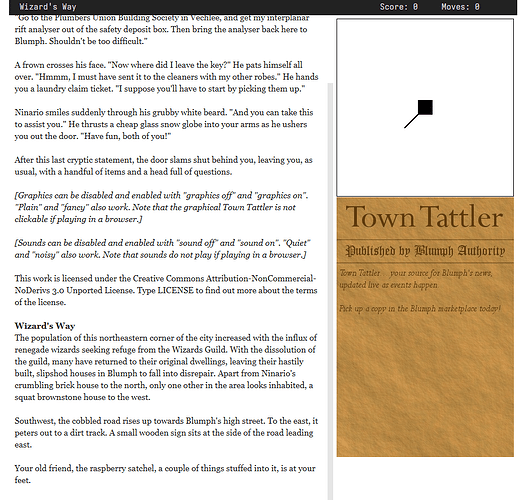Let’s meet more contestants!
A Dark Room
This is an idle/clicker game that eventually branches out into more complex options as the game progresses. It starts out with very minimalistic UI and writing, like this: (the history of the game is read from bottom to top):
Your goal is to light up the room and keep it warm.
Eventually you gain more options, like going out to gather wood, which is dangerous. You can recruit other people and make tools and even structures.
The main conceit of the game is that it has constant surprises, so most people will say ‘play it without reading anything about it’, and I think that’s pretty accurate, but it’s also fun to play even if you know what’s going on.
There’s a free version online (that I played) and a paid version on commercial platforms like Steam that unlocks more. I felt like this was both a great game in the video game sense and a great game in the IF sense, and it’s nice to see this on the list.
Tales from Castle Balderstone
A lot of great innovation in parser game voice and storytelling has been happening in the Balderstone series for the last 6-7 years. These are horror story compilations Ryan Veeder has put together each Halloween that include features like twine/parser integration and complex magic systems.
This game is the original one. Here the innovations are mostly in the fact its an anthology at all (you play several different games in a row with their own parser banner text) and in the way the stories are written.
These stories are designed to be unsettling and/or disturbing. Club Floyd called it ‘weirder than Cragne Manor’. It’s more ‘terror’ than ‘horror’ in that you’re more afraid of what might be happening than of jumpscares or traditional gore or anything.
The first story really sets the tone so I’d recommend trying it out for a few minutes.
Illuminismo Iniziato
Throughout the story-focused and puzzle-light revolution of the late 90’s and the 2000’s, there were frequent callbacks to older-style games. One of the most prolific genres was ‘silly fantasy where a wizard’s apprentice is given tasks by his master’. There were at least a dozen of such games, probably more, usually long with fairly complex puzzles.
Two of the most popular ones were Risorgimento Represso in 2003 and its much later 2018 sequel Illuminismo Iniziato, which is this game. Both are very polished, with puzzle difficulty tuned to feel challenging but fair, and with a lot of humor.
This sequel uses a variety of graphical features, like a newspaper and map:
As a sequel, it has connections to the first game, but as others have noted in their IFDB reviews, you can play, understand, and enjoy this game without having played the earlier one. It’s more like Simpsons or Sponge Bob or Family Guy continuity than like a serial drama.
If a person who has primarily played polished puzzleless or story-focused parser games wanted to get into old-school games, this would be a great option, as it has great hint systems and is very polished.
Christminster
Inform was made public in 1993 with the big game Curses, which took over the interactive fiction forums and revolutionized the field. The next year, in 1994, only one major game was released, the demo game Balances.
But in the third year, besides the IFComp which resulted in popular small games, three big Inform games were released that became pillars of the Inform catalogue: Jigsaw, Theatre, and Christminster.
Christminster is an academic drama that dives into thriller and occult sections later on, kind of like The Da Vinci Code in genre but not at all in style. It has a female protagonist, which was rare for the time. The idea is that your brother has gone missing and you have to find out what happens.
The opening area is iconic to me because this game was included in Frotz when I downloaded it in 2010 and I didn’t know how to play parser games, so I remember wandering around the college green (or whichever place this is), fascinated by the smooth polished npcs, random events, etc. like a parrot or a busker that is hiding balls under cups. Later on it includes things like a tense lobster dinner.
Jon Ingold said of it:
In thinking of great IF I keep coming back to this one - it’s puzzley but not too puzzley, it executes set-pieces in a way that might even have been novel for its time, and it balances progression and frustration excellently. Add to that the well-rendered setting that changes over time, the characterised NPCs and I think you’ve got something really special. One of my all-time favourites
The Abbey
This game belongs to the in-between time when Infocom was mostly ending and Inform wasn’t strong. This era had a lot of games made with PAWS or AGT or the commercial TADS engine or (in this case) a custom parser. The dominant genre at this time was ‘classic adventure’ where you go around a mostly-empty landscape grabbing everything you see and running into complex puzzles that wouldn’t necessarily make sense in the real world, while throwing in funny jokes or pop culture references with all sorts of genres. A lot of the modern retro community seems to target this era, so think PunyInform games or Garry Francis. The Unnkulia games were some of the most popular free games around this time.
This particular game was inspired by The Name of the Rose, which was really popular when I was a kid and was pretty cool when I read it. In the book, a monk investigates murders in an abbey and discovers ancient manuscripts hidden in a maze.
This game takes place after the events of the book. You explore an almost empty monastery and search several mazes, including the library and some catacombs. There are numerous code-like puzzles which require getting to unusual locations and finding patterns that wouldn’t make much sense in real life. You have to die to learn how to solve a couple of puzzles. I ended up using the walkthrough after about half an hour and enjoyed it.
Space was a premium in this era, and so almost everything is undescribed, even things that you’d really think ought to be. Many commands are also unrecognized, like LOOK UNDER. But if you just map out everything and pick up everything you see, you should have a good time.
I had to play using the online DOSBox link.
The Edifice
This was, I think, the third IFComp winner, and is mostly famous for its clever language puzzle, one which has been imitated several times (including by me!)
This is based off 2001: A Space Odyssey in its themes [actually, BG says that Lucian says that’s not true: The People's Champion Tournament: Lottery Results/Meet the Contestants/"Quiet Play" Commentary - #60 by bg]. You are a primitive proto-human who has experienced a black obelisk. Touching it transports you to important moments in human history, like learning language and taming horses. So, basically, you become different cavemen (or the same one at different times?) creating the most important points in early human pre-history.
The language puzzle involves trying to request medicine from a stranger. You learn the words he speaks by pointing at things or showing things, and you have to parrot the words back in different ways to get a response. Pretty neat!
Pick Up the Phone Booth and Aisle
Along with Alabaster, this was the other major game known for multiple contributors before Cragne Manor.
It’s a riff on two games, Pick up the Phone Booth and Die and Aisle. The former game is a dumb one-room game where, if you pick up the phone booth, you die. Only one other action lets you win. The second game is a one-room game in a supermarket where different actions you take let you remember your love in Italy (but in different variations).
This game takes the setting of Pick up the Phone Booth and Die and matches it with the mechanics of Aisle. Every action gives you a different ending. I’d recommend seeing the solution sheet on IFDB after trying a few on your own. They’re all completely random and there’s quite a bit of variety, so it’s basically like seeing a time-capsule of early 2000’s internet humor.
First Things First
This is a classic and well-known time travel game, so much that I’ve seen several people classify other games as ‘like First Things First time travel’.
It has a town that you can visit in 4 or 5 time periods, with your actions in the past affecting the future in a ripple effect. You can do things like money shenanigans or tree planting and have it affect the future.
The setting includes a lot of nature and suburbia and caves. You can lock yourself out of victory in a few ways, so be careful about that. The map is fairly compact, so while this game is long, it’s not super super long, and is definitely finishable.

